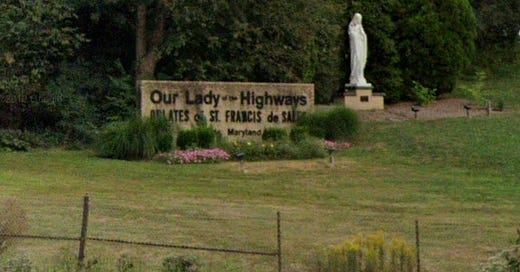Three Sundays ago, I went to Mass in person for the first time since February 2020. My church took awhile to dispense with an annoying online sign-up form and to get back to its usual times, but it’s operating normally now, and now that my wife and I have gone back to restaurants, there’s no excuse for holding out.
I was happy to be back, and yet when the priest began to prepare holy communion, I found myself muttering, “He’s using the long eucharistic prayer!”
The eucharistic prayer is basically the second half of the Catholic Mass, where the priest prepares and consecrates the bread and wine, and reads the associated prayers. There are several forms, of different lengths. Generally, if the sermon is long, the priest will choose the shortest of them. He didn’t preach very long last Sunday, and so in order to hit that one-hour sweet spot that Catholic masses tend to be, he chose a longer one.
Despite actually wanting to be at church, I still reflexively looked forward to getting out a couple of minutes early. I can still remember masses with my best friend growing up (also, obviously, Catholic), waiting to hit the all-you-can-eat Chinese buffet with our families after church, and exchanging a satisfied look when we knew it was going to end at 11:55 instead of 12.
I never really noticed or thought about this, but that recent Sunday morning, something clicked. I realized that quietly cheering at a priest’s shorter choice is a little bit like speeding to get somewhere early. All that intense focus and extra risk for...a couple of minutes. Why is it so satisfying when the arrival time on the navigator notches down a tad? Why does shaving 10 minutes off a three-hour trip feel like a hard-earned victory? And why is a little five-minute traffic delay so unbearably frustrating?
I’ve written here before about how urbanism has taught me to rethink things, and feel differently about personally getting around and navigating places, and this is one of them. I don’t like traffic, of course, but I’ve learned to take driving more seriously. To generally observe the limit, to focus on the road instead of flitting around looking for the fastest lane, to sit through delays and not expend useless energy getting frustrated. I find that these are choices I can make, despite not understanding them as such before I began to learn about and think about this whole cluster of urbanism and transportation issues.
My bigger takeaway here is that I’m aware, in a conscious way, that my feelings or habits or assumptions are not necessarily “true,” much less prophetic. I wrote recently about how a lot of “NIMBY” sentiment among suburbanites is just kind of the air you breathe, and it’s taken for granted. (In many suburban locales that’s beginning to change, and folks in favor of new growth and building are beginning to get an upper hand. But it was almost customary, in my small town/suburban childhood, to oppose pretty much any new thing, for a variety of reasons, or no reason. Some of this was tinged with racial or class resentment, but a lot of it was just inertia.)
To bring this together, take a look at this Twitter thread from late 2019, which I saw at the time and have remembered since. It’s about a Sacred Heart Auto League badge, hanging on the author’s basement door, left by a previous occupant of the house. This might look like a piece of midcentury Catholic-Americana kitsch, but the old “Driver’s Prayer” the Auto League used to publish (I’m not sure they do anymore) is incredible. It almost feels like a whole lost way of thinking about driving, as a grave, fearsome responsibility:
Sacred Heart of Jesus, grant me
a steady hand and watchful eye,
that none be hurt as I pass by.
Thou givest life. I pray no act of mine
take away or mar that gift Divine.
Protect those, Lord, who travel with me
from highway dangers and all anxiety.
Teach me to use my car for others' needs
and never miss the beauty of Thy
world through excessive speed.
I pledge to drive with loving concern
to my every destination,
offering each travel hour to Thee
in a spirit of reparation.
Most Sacred Heart of Jesus,
my auto Companion,
have mercy on me.
Many parents and driving instructors try to communicate this to their teens or students, but it is very far from our general cultural attitude about driving. It’s fitting, then, that my reflexive annoyance at attending Mass for five extra minutes led me to thinking about driving more slowly.
Related Reading:



